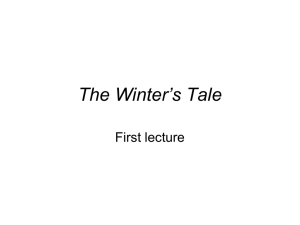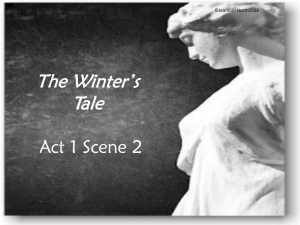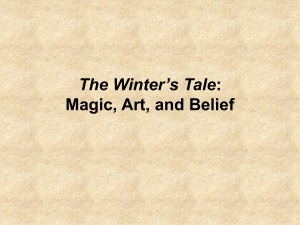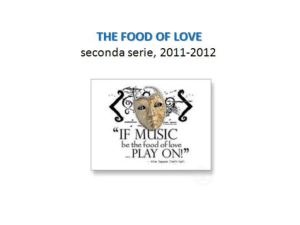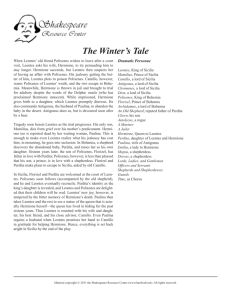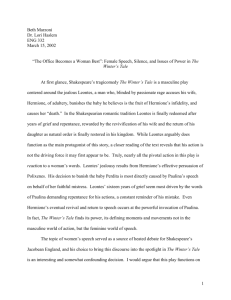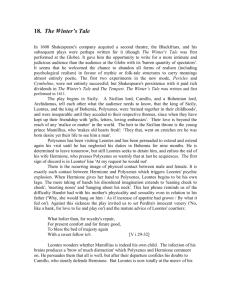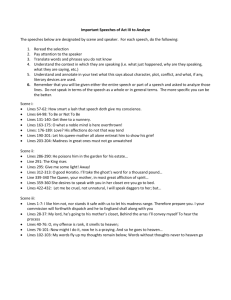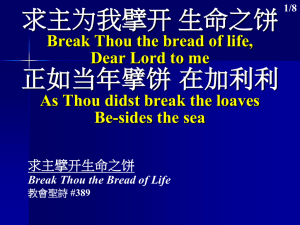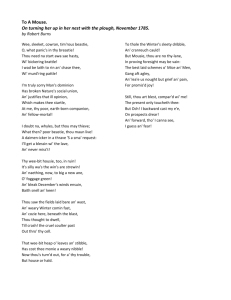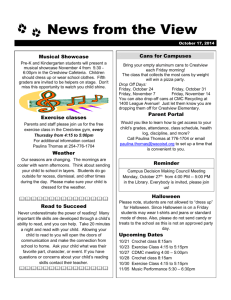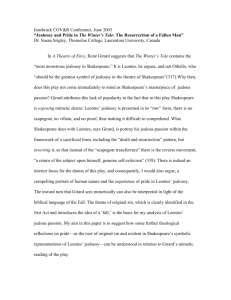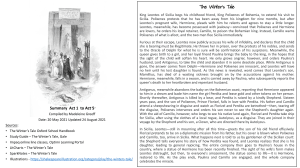WINTER`S TALE Summary Polixenes, the king of Bohemia, is the
advertisement
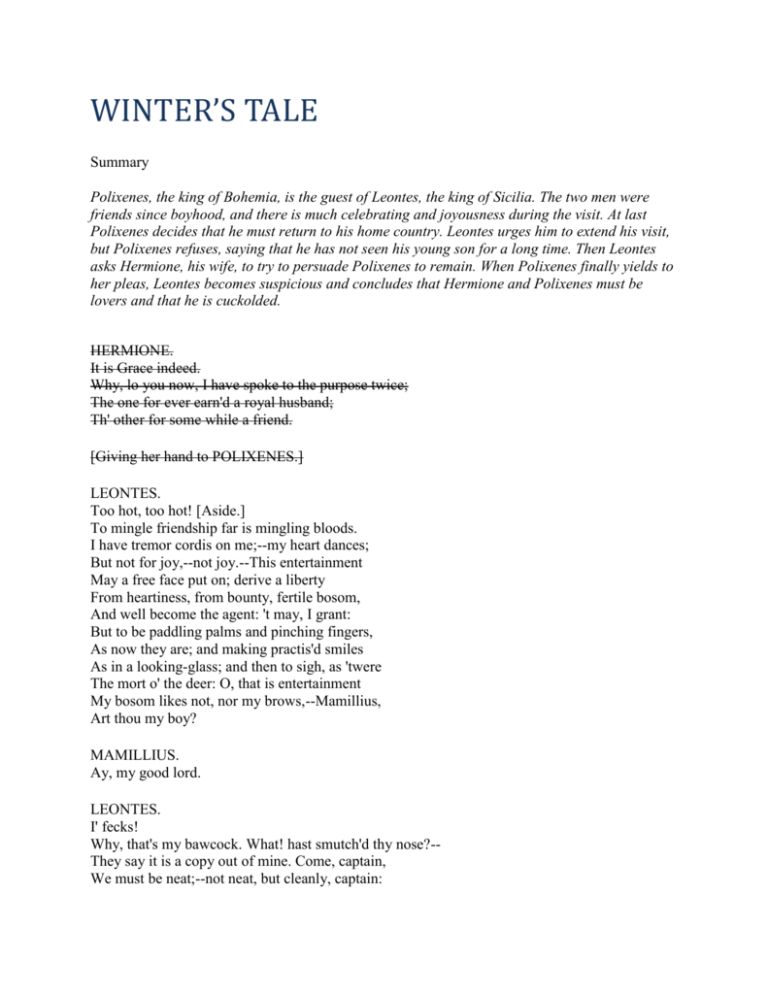
WINTER’S TALE Summary Polixenes, the king of Bohemia, is the guest of Leontes, the king of Sicilia. The two men were friends since boyhood, and there is much celebrating and joyousness during the visit. At last Polixenes decides that he must return to his home country. Leontes urges him to extend his visit, but Polixenes refuses, saying that he has not seen his young son for a long time. Then Leontes asks Hermione, his wife, to try to persuade Polixenes to remain. When Polixenes finally yields to her pleas, Leontes becomes suspicious and concludes that Hermione and Polixenes must be lovers and that he is cuckolded. HERMIONE. It is Grace indeed. Why, lo you now, I have spoke to the purpose twice; The one for ever earn'd a royal husband; Th' other for some while a friend. [Giving her hand to POLIXENES.] LEONTES. Too hot, too hot! [Aside.] To mingle friendship far is mingling bloods. I have tremor cordis on me;--my heart dances; But not for joy,--not joy.--This entertainment May a free face put on; derive a liberty From heartiness, from bounty, fertile bosom, And well become the agent: 't may, I grant: But to be paddling palms and pinching fingers, As now they are; and making practis'd smiles As in a looking-glass; and then to sigh, as 'twere The mort o' the deer: O, that is entertainment My bosom likes not, nor my brows,--Mamillius, Art thou my boy? MAMILLIUS. Ay, my good lord. LEONTES. I' fecks! Why, that's my bawcock. What! hast smutch'd thy nose?-They say it is a copy out of mine. Come, captain, We must be neat;--not neat, but cleanly, captain: And yet the steer, the heifer, and the calf, Are all call'd neat.--Still virginalling [Observing POL. and HER.] Upon his palm?--How now, you wanton calf! Art thou my calf? MAMILLIUS. Yes, if you will, my lord. LEONTES. Thou want'st a rough pash, and the shoots that I have, To be full like me:--yet they say we are Almost as like as eggs; women say so, That will say anything: but were they false As o'er-dy'd blacks, as wind, as waters,--false As dice are to be wish'd by one that fixes No bourn 'twixt his and mine; yet were it true To say this boy were like me.--Come, sir page, Look on me with your welkin eye: sweet villain! Most dear'st! my collop!--Can thy dam?--may't be? Affection! thy intention stabs the centre: Thou dost make possible things not so held, Communicat'st with dreams;--how can this be?-With what's unreal thou co-active art, And fellow'st nothing: then 'tis very credent Thou mayst co-join with something; and thou dost,-And that beyond commission; and I find it,-And that to the infection of my brains And hardening of my brows. … Inch-thick, knee-deep, o'er head and ears a fork'd one!-Go, play, boy, play:-- thy mother plays, and I Play too; but so disgrac'd a part, whose issue Will hiss me to my grave: contempt and clamour Will be my knell.--Go, play, boy, play.--There have been, Or I am much deceiv'd, cuckolds ere now; And many a man there is, even at this present, Now while I speak this, holds his wife by the arm That little thinks she has been sluic'd in his absence, And his pond fish'd by his next neighbour, by Sir Smile, his neighbour; nay, there's comfort in't, Whiles other men have gates, and those gates open'd, As mine, against their will: should all despair That hath revolted wives, the tenth of mankind Would hang themselves. Physic for't there's none; It is a bawdy planet, that will strike Where 'tis predominant; and 'tis powerful, think it, From east, west, north, and south: be it concluded, No barricado for a belly: know't; It will let in and out the enemy With bag and baggage. Many thousand of us Have the disease, and feel't not.--How now, boy! MAMILLIUS. I am like you, they say. … CAMILLO. I would not be a stander-by to hear My sovereign mistress clouded so, without My present vengeance taken: 'shrew my heart, You never spoke what did become you less Than this; which to reiterate were sin As deep as that, though true. LEONTES. Is whispering nothing? Is leaning cheek to cheek? is meeting noses? Kissing with inside lip? Stopping the career Of laughter with a sigh?--a note infallible Of breaking honesty;--horsing foot on foot? Skulking in corners? wishing clocks more swift; Hours, minutes; noon, midnight? and all eyes Blind with the pin and web but theirs, theirs only, That would unseen be wicked?--is this nothing? Why, then the world and all that's in't is nothing; The covering sky is nothing; Bohemia nothing; My is nothing; nor nothing have these nothings, If this be nothing. The king, refusing to believe the oracle, declares its findings false and again accuses Hermione of infidelity. In the middle of his tirade, a servant rushes in to say that young Mamillius died because of sorrow and anxiety over his mother’s plight. On hearing this, Hermione falls into a swoon and is carried to her chambers. Soon afterward, Paulina returns to announce that her mistress is dead. At this news Leontes, who begins to believe the oracle after news of his son’s death, beats his breast with rage at himself. He reproaches himself bitterly for the insane jealousy that led to these unhappy events. In repentance, the king swears that he will have the legend of the deaths of his son and wife engraved on their tombstones and that he himself will do penance thereafter. PAULINA. Woe the while! O, cut my lace, lest my heart, cracking it, Break too! FIRST LORD. What fit is this, good lady? PAULINA. What studied torments, tyrant, hast for me? What wheels? racks? fires? what flaying? boiling In leads or oils? what old or newer torture Must I receive, whose every word deserves To taste of thy most worst? Thy tyranny Together working with thy jealousies,-Fancies too weak for boys, too green and idle For girls of nine,--O, think what they have done, And then run mad indeed,--stark mad! for all Thy by-gone fooleries were but spices of it. That thou betray'dst Polixenes, 'twas nothing; That did but show thee, of a fool, inconstant, And damnable ingrateful; nor was't much Thou wouldst have poison'd good Camillo's honour, To have him kill a king; poor trespasses,-More monstrous standing by: whereof I reckon The casting forth to crows thy baby daughter, To be or none or little, though a devil Would have shed water out of fire ere done't; Nor is't directly laid to thee, the death Of the young prince, whose honourable thoughts,-Thoughts high for one so tender,--cleft the heart That could conceive a gross and foolish sire Blemish'd his gracious dam: this is not,--no, Laid to thy answer: but the last,--O lords, When I have said, cry Woe!,--the queen, the queen, The sweetest, dearest creature's dead; and vengeance for't Not dropp'd down yet. FIRST LORD. The higher powers forbid! PAULINA. I say she's dead: I'll swear't. If word nor oath Prevail not, go and see: if you can bring Tincture, or lustre, in her lip, her eye, Heat outwardly or breath within, I'll serve you As I would do the gods.--But, O thou tyrant! Do not repent these things; for they are heavier Than all thy woes can stir; therefore betake thee To nothing but despair. A thousand knees Ten thousand years together, naked, fasting, Upon a barren mountain, and still winter In storm perpetual, could not move the gods To look that way thou wert. Sixteen years pass, bringing with them many changes. Leontes is a broken man, grieving alone in his palace. Perdita grows into a beautiful and a charming young woman under the care of the shepherd. She is so lovely that Prince Florizel, the son of Polixenes and heir to the throne of Bohemia, falls madly in love with her. [Enter Time, as Chorus.] TIME. I,--that please some, try all; both joy and terror Of good and bad; that make and unfold error,-Now take upon me, in the name of Time, To use my wings. Impute it not a crime To me or my swift passage, that I slide O'er sixteen years, and leave the growth untried Of that wide gap, since it is in my power To o'erthrow law, and in one self-born hour To plant and o'erwhelm custom. Let me pass The same I am, ere ancient'st order was Or what is now received: I witness to The times that brought them in; so shall I do To the freshest things now reigning, and make stale The glistering of this present, as my tale Now seems to it. Your patience this allowing, I turn my glass, and give my scene such growing As you had slept between. Leontes leaving The effects of his fond jealousies, so grieving That he shuts up himself; imagine me, Gentle spectators, that I now may be In fair Bohemia; and remember well, I mention'd a son o' the king's, which Florizel I now name to you; and with speed so pace To speak of Perdita, now grown in grace Equal with wondering: what of her ensues, I list not prophesy; but let Time's news Be known when 'tis brought forth:--a shepherd's daughter, And what to her adheres, which follows after, Is the argument of Time. Of this allow, If ever you have spent time worse ere now; If never, yet that Time himself doth say He wishes earnestly you never may. [Exit.] One day, Paulina asks Leontes to visit a newly erected statue of the dead woman in Hermione’s chapel. Leontes, ever faithful to the memory of his dead wife—even to the point of promising Paulina never to marry again—gathers his guests and takes them to view the statue. Standing in the chapel, amazed at the wonderful lifelike quality of the work, they hear strains of soft music. Suddenly the statue descends from its pedestal and is revealed as the living Hermione. She spent the sixteen years in seclusion while awaiting some word of her daughter. The happy family is reunited, and Hermione completely forgives her repentant husband. He and Polixenes are again the best of friends, rejoicing in the happiness of Perdita and Florizel. LEONTES. O Paulina, We honour you with trouble:--but we came To see the statue of our queen: your gallery Have we pass'd through, not without much content In many singularities; but we saw not That which my daughter came to look upon, The statue of her mother. PAULINA. As she liv'd peerless, So her dead likeness, I do well believe, Excels whatever yet you look'd upon Or hand of man hath done; therefore I keep it Lonely, apart. But here it is: prepare To see the life as lively mock'd as ever Still sleep mock'd death: behold; and say 'tis well. [PAULINA undraws a curtain, and discovers HERMIONE, standing as a statue.] I like your silence,--it the more shows off Your wonder: but yet speak;--first, you, my liege. Comes it not something near? LEONTES. Her natural posture!-Chide me, dear stone, that I may say indeed Thou art Hermione; or rather, thou art she In thy not chiding; for she was as tender As infancy and grace.--But yet, Paulina, Hermione was not so much wrinkled; nothing So aged, as this seems. POLIXENES. O, not by much! PAULINA. So much the more our carver's excellence; Which lets go by some sixteen years, and makes her As she liv'd now. LEONTES. As now she might have done, So much to my good comfort, as it is Now piercing to my soul. O, thus she stood, Even with such life of majesty,--warm life, As now it coldly stands,--when first I woo'd her! I am asham'd: does not the stone rebuke me For being more stone than it?--O royal piece, There's magic in thy majesty; which has My evils conjur'd to remembrance; and From thy admiring daughter took the spirits, Standing like stone with thee! PERDITA. And give me leave; And do not say 'tis superstition, that I kneel, and then implore her blessing.--Lady, Dear queen, that ended when I but began, Give me that hand of yours to kiss. PAULINA. O, patience! The statue is but newly fix'd, the colour's Not dry. CAMILLO. My lord, your sorrow was too sore laid on, Which sixteen winters cannot blow away, So many summers dry; scarce any joy Did ever so long live; no sorrow But kill'd itself much sooner. POLIXENES. Dear my brother, Let him that was the cause of this have power To take off so much grief from you as he Will piece up in himself. PAULINA. Indeed, my lord, If I had thought the sight of my poor image Would thus have wrought you,--for the stone is mine,-I'd not have show'd it. LEONTES. Do not draw the curtain. PAULINA. No longer shall you gaze on't; lest your fancy May think anon it moves. LEONTES. Let be, let be.-Would I were dead, but that, methinks, already-What was he that did make it? See, my lord, Would you not deem it breath'd, and that those veins Did verily bear blood? POLIXENES. Masterly done: The very life seems warm upon her lip. LEONTES. The fixture of her eye has motion in't, As we are mock'd with art. PAULINA. I'll draw the curtain: My lord's almost so far transported that He'll think anon it lives. LEONTES. O sweet Paulina, Make me to think so twenty years together! No settled senses of the world can match The pleasure of that madness. Let 't alone. PAULINA. I am sorry, sir, I have thus far stirr'd you: but I could afflict you further. LEONTES. Do, Paulina; For this affliction has a taste as sweet As any cordial comfort.--Still, methinks, There is an air comes from her: what fine chisel Could ever yet cut breath? Let no man mock me, For I will kiss her! PAULINA. Good my lord, forbear: The ruddiness upon her lip is wet; You'll mar it if you kiss it; stain your own With oily painting. Shall I draw the curtain? LEONTES. No, not these twenty years. PERDITA. So long could I Stand by, a looker on. PAULINA. Either forbear, Quit presently the chapel, or resolve you For more amazement. If you can behold it, I'll make the statue move indeed, descend, And take you by the hand, but then you'll think,-Which I protest against,--I am assisted By wicked powers. LEONTES. What you can make her do I am content to look on: what to speak, I am content to hear; for 'tis as easy To make her speak as move. PAULINA. It is requir'd You do awake your faith. Then all stand still; Or those that think it is unlawful business I am about, let them depart. LEONTES. Proceed: No foot shall stir. PAULINA. Music, awake her: strike.--[Music.] 'Tis time; descend; be stone no more; approach; Strike all that look upon with marvel. Come; I'll fill your grave up: stir; nay, come away; Bequeath to death your numbness, for from him Dear life redeems you.--You perceive she stirs. [HERMIONE comes down from the pedestal.] Start not; her actions shall be holy as You hear my spell is lawful: do not shun her Until you see her die again; for then You kill her double. Nay, present your hand: When she was young you woo'd her; now in age Is she become the suitor. LEONTES. O, she's warm! [Embracing her.] If this be magic, let it be an art Lawful as eating. POLIXENES. She embraces him. CAMILLO. She hangs about his neck: If she pertain to life, let her speak too. POLIXENES. Ay, and make it manifest where she has liv'd, Or how stol'n from the dead. PAULINA. That she is living, Were it but told you, should be hooted at Like an old tale; but it appears she lives, Though yet she speak not. Mark a little while.-Please you to interpose, fair madam: kneel, And pray your mother's blessing.--Turn, good lady; Our Perdita is found. [Presenting PERDITA, who kneels to HERMIONE.] HERMIONE. You gods, look down, And from your sacred vials pour your graces Upon my daughter's head!--Tell me, mine own, Where hast thou been preserv'd? where liv'd? how found Thy father's court? for thou shalt hear that I,-Knowing by Paulina that the oracle Gave hope thou wast in being,--have preserv'd Myself to see the issue. PAULINA. There's time enough for that; Lest they desire upon this push to trouble Your joys with like relation.--Go together, You precious winners all; your exultation Partake to every one. I, an old turtle, Will wing me to some wither'd bough, and there My mate, that's never to be found again, Lament till I am lost. LEONTES. O peace, Paulina! Thou shouldst a husband take by my consent, As I by thine a wife: this is a match, And made between's by vows. Thou hast found mine; But how, is to be question'd: for I saw her, As I thought, dead; and have, in vain, said many A prayer upon her grave. I'll not seek far,-For him, I partly know his mind,--to find thee An honourable husband.--Come, Camillo, And take her by the hand, whose worth and honesty Is richly noted, and here justified By us, a pair of kings.--Let's from this place.-What! look upon my brother:--both your pardons, That e'er I put between your holy looks My ill suspicion.--This your son-in-law, And son unto the king, whom heavens directing, Is troth-plight to your daughter.--Good Paulina, Lead us from hence; where we may leisurely Each one demand, and answer to his part Perform'd in this wide gap of time, since first We were dissever'd: hastily lead away.! [Exeunt.]
